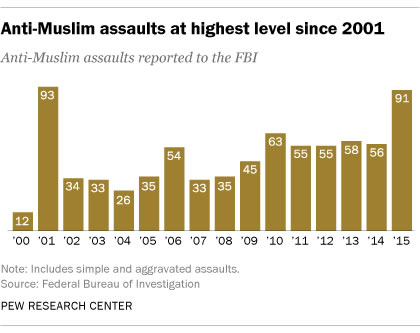Prejudiced rhetoric leads to rise in anti-Muslim attacks

Anti-Muslim assaults reported to the FBI have gradually risen over the past 15 years, according to a 2016 Pew Research Center study.
According to the Oxford Dictionary, Islamophobia is the “dislike of or prejudice against Islam or Muslims, especially as a political force.”
Small acts of prejudice can be classified under the umbrella of this effect. For instance, anything as small as choosing a seat on public transit, purposefully away from someone who appears to be of the Muslim religion, can be classified under this umbrella of Islamophobia. Perhaps the most common example of Islamophobia is seeing a follower of the Muslim religion and immediately making the assumption that they are connected to some kind of terrorist group.
The options are not limited to just these small acts, for there are much more violent offenses. Yelling racial slurs, disrespecting houses of worship and even murder are just some of the actions people take to avoid the Islamic community. What makes these actions justified? Why do we, as Americans, have to go to do nothing more than mind our own business?
Even though there have been instances of terrorism on U.S. soil by those who claim their allegiance to ISIS, or any other group from the Islamic community, not all Muslims are terrorists. According to the FBI, 94 percent of terrorist attacks in the U.S. since 1980 are committed by non-muslims.
According to the FBI, since the infamous 9/11 epidemic, there has been a number of anti-Muslim assaults. In 2001, the number of attacks stood at 93 and has since gone down. Even though there was slight fluctuation with the numbers, there was a noticeable spike in 2015, when the number of assaults measured 91, just a mere two assaults short of the initial year of the 9/11 attacks.
Americans cannot blame the entire group of religious followers for the attacks committed by the few terrorists who follow the Islamic religion. There have been many instances of terror on those of the Muslim faith at the hands of Americans. Some argue that new President-elect Donald Trump has begun this anti-Islam movement, seeing as though many of the attacker’s actions on Muslims are “justified” by their support for Trump.
In mid November 2016, letters of Muslim genocide were sent to mosques in California. In these letters, it was said that Trump is “going to cleanse America,” and it was also mentioned that the writer was going to “do to the Muslims as Hitler did to the Jews.”
In recent and more local terms, in mid November, a Bethel Park man was arrested for assaulting a Muslim man at a Red Robin restaurant. He reportedly had begun to use ethnic slurs against the man, and then proceeded to punch the victim in the head without any provocation.
The accuser was later charged with ethnic intimidation, simple assault, harassment and public drunkenness. Bethel Park is approximately an hour drive away from the Beaver County Courthouse. Even though there may have been a much larger concern in California, each act is, by definition, classified under Islamophobia.
Mass genocide in places of worship? Assault? How is this justified under the Constitution?
Our Constitution prohibits the making of any kind of law that discriminates against free religions. There is also the right to freedom of speech listed in the First Amendment. Just because we have the freedom of speech as Americans doesn’t mean that we can say whatever we please whenever we please. Racist comments at the hands of Trump may not be favored, but they are not deemed as unconstitutional because of the freedom of speech. Terroristic threats from those who don’t agree with the Muslim religion are a different matter.
Despite instances such as the Orlando shootings, 9/11 or even the recent Ohio State University stabbings, there is still a vast majority of Muslim Americans who are positive influences in America.
In 2015, there was an estimated 1 percent of Muslims living in the U.S. Besides the small percentage of the Muslims in America, about 0.3 percent of the U.S. military is composed of Muslim Americans. Aside from military services, there have been many influential Muslim Americans who have impacted the U.S., such as Professor Fazlur Rahman Khan.
Khan had pioneered a new structure system that a new generation of skyscrapers had been built with. These skyscrapers range anywhere from the Sears Tower to the World Trade Center buildings. What would America look like today without these innovations?
The issue that then becomes quite concerning is the danger of what this prejudiced mindset means for the future of the country. What could become of the country if its people keep a close-minded prejudice about those who live on the same streets as they do? If we don’t look at the overall picture, what could happen to the future of America?


